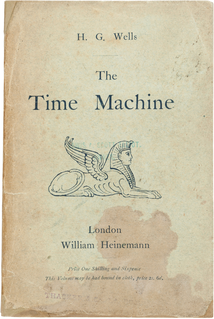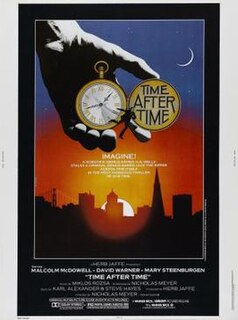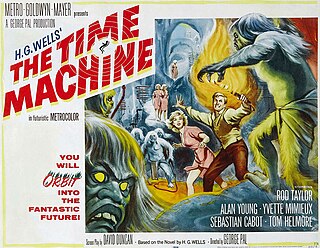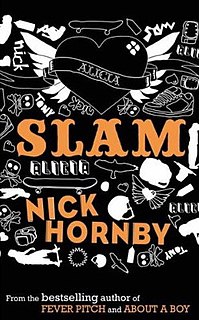
Time travel is the concept of movement between certain points in time, analogous to movement between different points in space by an object or a person, typically with the use of a hypothetical device known as a time machine. Time travel is a widely recognized concept in philosophy and fiction, particularly science fiction. The idea of a time machine was popularized by H. G. Wells' 1895 novel The Time Machine.
" '—All You Zombies—' " is a science fiction short story by American writer Robert A. Heinlein. It was written in one day, July 11, 1958, and first published in the March 1959 issue of Fantasy and Science Fiction magazine after being rejected by Playboy.

Time After Time is a 1979 American science fiction film directed by screenwriter Nicholas Meyer and starring Malcolm McDowell, David Warner, and Mary Steenburgen. Filmed in Panavision, it was the directing debut of Meyer, whose screenplay is based on the premise from Karl Alexander's novel Time After Time and a story by Alexander and Steve Hayes. The film presents a story in which British author H. G. Wells uses his time machine to pursue Jack the Ripper into the 20th century.

Time travel is a common theme in fiction, mainly since the late 19th century, and has been depicted in a variety of media, such as literature, television, film, and advertisements.

John Locke is a fictional character played by Terry O'Quinn on the ABC television series Lost. He is named after the English philosopher of the same name. In 2007, O'Quinn won the Primetime Emmy Award for Outstanding Supporting Actor in a Drama Series for his portrayal of Locke.

Rip Hunter is a fictional superhero appearing in American comic books published by DC Comics. Created by writer Jack Miller and artist Ruben Moreira, the character first appeared in Showcase #20. Following three more appearances in Showcase, Rip Hunter was given his own series which ran for 29 issues (1961–65). He later starred in the eight-issue Time Masters series (1990), written by Bob Wayne and Lewis Shiner. After numerous revisions and following the events of the 2005 "Infinite Crisis" storyline, Hunter is established as the son of Booster Gold.

Lightning is a novel by American writer Dean Koontz, released in 1988. A 2003 reprinting includes a new afterword by the author, discussing editorial politics.
"The Doodle" is the 106th episode of the NBC sitcom Seinfeld. This is the 20th episode for the sixth season and aired on April 6, 1995. In this episode, Jerry's apartment is infested with fleas, George struggles over his girlfriend's opinion of his physical appearance, Kramer indulges his love for Mackinaw peaches, and Elaine loses a literary manuscript that she is expected to review for a job interview.

Unnatural History is an original novel written by Jonathan Blum and Kate Orman and based on the long-running British science fiction television series Doctor Who. It features the Eighth Doctor, Sam, Fitz and Faction Paradox.
Hiro Nakamura is a fictional superhero on the NBC superhero drama Heroes who possesses the ability of space-time manipulation. This means that Hiro is able to alter the flow of time, teleport and time travel. In the show, he is played by Japanese-American actor Masi Oka.

Mohinder Suresh is a fictional character on the NBC drama Heroes, portrayed by Sendhil Ramamurthy. He is from Chennai, Tamil Nadu, India and is a genetics professor at the University of Madras who holds a PhD in parapsychology. He is attempting to find the truth behind the sudden death of his father, Chandra Suresh, and to continue his father's research finding the 'superhuman' beings on Earth. In character, Suresh also provides many episodes with opening and/or closing dialogue, generally philosophical musings regarding the events that take place during the episode.

Neverwhere is the companion novelisation written by English author Neil Gaiman of the television serial Neverwhere, written by Gaiman and devised by Lenny Henry. The plot and characters are exactly the same as in the series, with the exception that the novel form allowed Gaiman to expand and elaborate on certain elements of the story and restore changes made in the televised version from his original plans. Most notable is the appearance of the Floating Market at Harrods rather than under Battersea power station. This is because the management of Harrods changed their minds about proposed filming. The novel was originally released by BBC Books in 1996, three episodes into the television series run. It was accompanied by a spoken word CD and cassette release, also by the BBC.

Slam is a novel written by British author Nick Hornby, published in 2007. The book's main theme is teenage pregnancy and it is written from the perspective of a teenager, Sam.

Timestalkers is a 1987 American made-for-television science fiction film directed by Michael Schultz and starring William Devane. The film is based on Ray Brown's story The Tintype.
"The Playbook" is the eighth episode of the fifth season of the CBS situation comedy How I Met Your Mother and 96th episode overall. It originally aired November 16, 2009. A book based on the episode was published in 2010.
There have been various accounts of persons who allegedly travelled through time reported by the press or circulated on the Internet. These reports have turned out either to be hoaxes or to be based on incorrect assumptions, incomplete information, or interpretation of fiction as fact, many being now recognized as urban legends.
"The Time Travelers" is the 20th episode of the eighth season of the CBS sitcom How I Met Your Mother, and the 180th episode overall.
The Garden of Sinners: Paradox Spiral is a 2008 Japanese animated film produced by ufotable based on The Garden of Sinners novels by Kinoko Nasu. It is the fifth installment in the series, preceded by The Hollow Shrine (2008) and followed by Oblivion Recording (2008). Chronologically, the events that occur in The Garden of Sinners: Paradox Spiral are the sixth in the timeline of the series.

A causal loop or pre-destination paradox is a theoretical proposition in which, by means of either retrocausality or time travel, a sequence of events is among the causes of another event, which is in turn among the causes of the first-mentioned event. Such causally looped events then exist in spacetime, but their origin cannot be determined. A hypothetical example of a causality loop is given of a billiard ball striking its past self: the billiard ball moves in a path towards a time machine, and the future self of the billiard ball emerges from the time machine before its past self enters it, giving its past self a glancing blow, altering the past ball's path and causing it to enter the time machine at an angle that would cause its future self to strike its past self the very glancing blow that altered its path. In this sequence of events, the change in the ball's path is its own cause, which might appear paradoxical.
"Finish Line" is a four issue monthly American comic book story written by Joshua Williamson and illustrated by Howard Porter. The storyline was published by DC Comics and features characters from the Flash comics. The story appeared in issues #759–762 of The Flash, running from August to September 2020. The storyline received critical acclaim for the action, plot, art, and the ending. "Finish Line" was the final story written by Joshua Williamson before Kevin Shinick began his run on the title.












